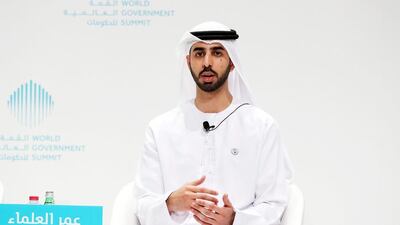A team of enterprising Emirati teenagers are ready to take on the world as the robotic Olympics come to Dubai.
Seven secondary school pupils from remote parts of the UAE will come together at the First Global Dubai Challenge, an event celebrating how technical innovation can help overcome the greatest challenges facing the planet.
The annual competition, in which 191 countries will take part, will be hosted in the Middle East for the first time from October 24 to 27.
The previous two competitions were held in the American capital, Washington D.C, and Mexico City.
Omar Al Olama, the UAE's Minister of State for Artificial Intelligence, said the youngsters are "role models for Emirati youth".
The theme of this year's installment is Ocean Opportunities, which will educate children, aged between 14 and 18, on the urgent need to take action and preserve oceans.
Hamad Albedwawi, Abdullah Ameen, Ghazi Alshareef, Mohamed Elashkar and Abdulrahman Alkaabi from Rashid Bin Saeed School in Hatta, and Shouq Al Dhanhani and Sheikha Al Soreidi from Dibba School in Fujairah are the pupils on the UAE’s team.
"These youth represent the UAE’s ambition of moving into science, engineering and mathematics," said Mr Al Olama.
"They really represent what the UAE is about and are ambitious and have ideas on robotics. They have won multiple robotics competitions in the past in China and in other countries.
"We are very excited to see them compete with the best pupils from across the world and I hope they can be the winners this year."
The minister said he hoped the children's efforts would inspire more young people to embrace science and robotics.
"Once the Emirati and non-Emirati pupils see children of their age group create robotic solutions and work on advanced projects, they will aspire to be like them," he said.
"Some of the participants are coming from countries that are not wealthy and their schools do not have the facilities that ours do, yet they are able to carry out advanced robotic projects."
Across the world, regional competitions were held to select the teams who would participate at the competition.
Each team would be handed an identical kit, which they must use to put the robots together without the help of instructions.
For example, pupils may be given a pool full of water on which there is a layer of oil and asked to create a robot that could clear the layer of oil from the water.
Pupils will learn about the real-world challenges of cleaning up the oceans.
Khalfan Belhoul, chief executive of the Dubai Future Foundation, said the theme is an important one as the "contamination of oceans and climate change are big issues."
He said that cleaning oceans is a priority.
Mr Belhoul said the pupils who win the competition would qualify for tournaments in other parts of the world.
"The ultimate goal is not an award but it is about how they can excel in robotics and how we can facilitate their growth," he said.
"The whole purpose of this competition is to help children excel in this field."


